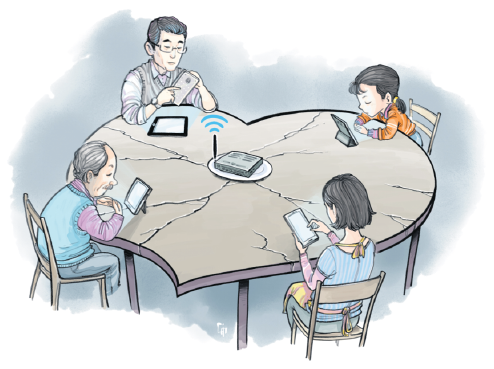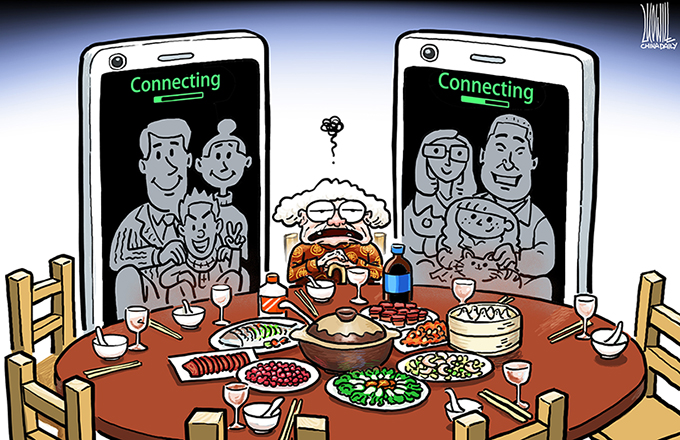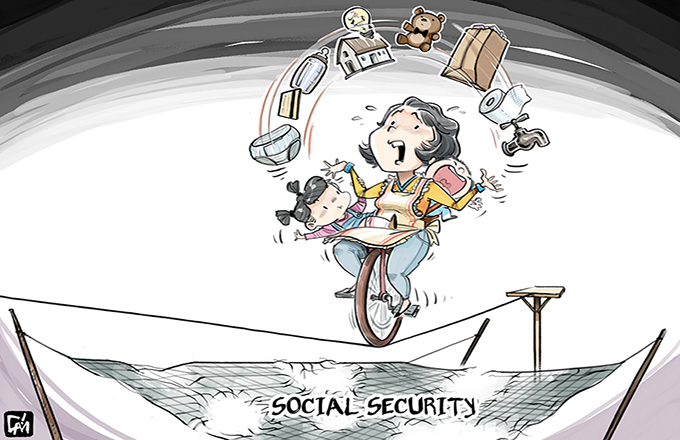So near yet so far, thanks to technology
 |
| CAI MENG/CHINA DAILY |
Spring Festival, which falls on Saturday this year, is coming. In a few days, the festival will be celebrated with family reunions and parties.
Yet today the parties are different than they used to be. People are not together in the same home, but instead gather together in cyberspace.
It is another symptom of the so-called smartphone reliance syndrome. For many people the first thing they do after waking up in the morning is picking up their smartphone and the last thing they do before they go sleep is putting it down.
We use the smartphone in office, at home, even on the road; we play with it while eating, drinking, even while bathing. But really it is not the fault of our smartphones, which were created to help us communicate with one another and bring more convenience to our lives. For in reality that is what smartphones do: We can now chat live with people tens of thousands of kilometers away with unprecedented convenience.
But ironically, we feel more distanced from each other in the real world. The reason is that we have more choices now, and we have to keep up with virtual conversations for fear that we will miss out on something. We no longer have to pretend to be interested in someone standing before us, because we can just interact with someone more interesting somewhere else.
Smartphones and other smart devices have revolutionized the way we interact with each other more radically than anybody could have imagined. We have adapted to the technology, not vice versa.
However, one group risks being left behind by this trend. The elderly in our society do not accept new technologies as fast as the younger generation and they can not enjoy the convenience of new technologies in the same way. Very few seniors know how to use a smartphone, and the major cellphone manufacturers have all developed special cellphones with only basic functions to suit their needs.
They even don't access the internet much. According to a survey report of the internet in China, released by China Internet Network Information Center, there were 731 million netizens by the end of 2016, but only 4 percent of them were above the age of 60.
The elderly face the loneliness of being "left behind" by their children who work in cities far away. Spring Festival is almost the only chance for them to talk with the younger generation, yet smartphones deprive them of this opportunity.
The only way the younger and elder generations can meaningfully interact is if the former put down their smartphones during this Spring Festival holiday and talk with their older relatives face to face.
And by doing so, we will also be doing ourselves a favor. Today we are the digital pioneers, but we won't be in 30 years. It is our children that will be blazing a trail with the latest technologies, and we, slow to accept new things, will be left to our own devices.
If we hope our children will talk with us 30 years later, we need to set a good example for them now.
The author is a writer with China Daily.
zhangzhouxiang@chinadaily.com.cn
- Spring Festival survival tips for foreigners
- Premier Li gives villagers Spring Festival gifts
- Spring Festival – a snapshot in time
- Single this Spring Festival? The good news is you're not alone
- Holiday shopping as Spring Festival approaches
- People across China greet upcoming Spring Festival
- Family still the beating heart of Spring Festival

























